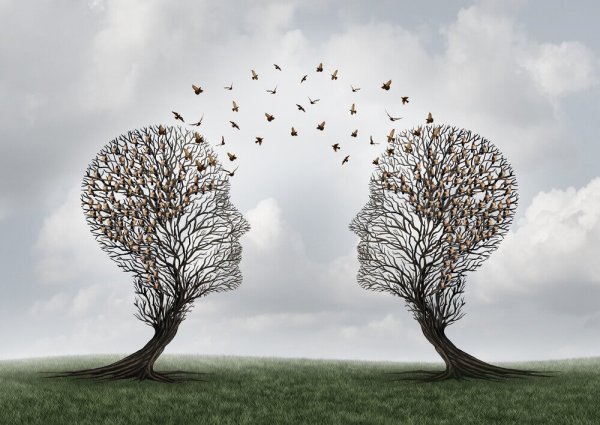(Exploring Your Mind) Do you value other people’s opinions? Do you take into account different perspectives?
Related Admitting Your Grievances Against Your Partner: Your Best Hope For Healing Your Relationship
by Staff Writer, July 31st, 2019
It’s not always easy to value other people’s opinions. This is because, when they’re completely different from our own, we usually prioritize our own way of seeing things. This can cause us to become uncompromising people and to refuse to analyze how others perceive reality. Instead of enriching us, we end up impoverished.
If we act this way, it’s because (even though we may deny it) we always like to be right. However, as the article “Relationship Between Two Concepts: Information, Knowledge and Value, Similarities and Differences” points out, you can only be right if you run the risk of being wrong.
Buy Book 8 Keys to Eliminating Passive-Aggressiveness (8 Keys to Mental Health)
In order to open our eyes to this widespread attitude, today we’re going to look at a story that will help us value other people’s opinions – opinions that come from the knowledge that stems from their own individual backgrounds. If you read it with an open mind, you’ll certainly benefit from it.

The tale of the six blind sages and the elephant
Once upon a time, there were six wise men who lived in a small village. All six of them were blind. One day, someone took an elephant to the village. Faced with such a situation, the six men looked for ways to know what an elephant was like since they couldn’t see it.
“I know,” one of them said. “Let’s touch it!”
“Good idea,” said the others. “That way, we’ll surely know what an elephant is like.”
Thus, the first wise man felt one of the elephant’s big ears. He touched it slowly, back and forth.
“The elephant is like a big fan,” said the first sage.
The second, feeling the elephant’s legs, exclaimed: “It’s like a tree!”
[the_ad id=”69046″]
“You’re both wrong,” said the third sage after examining the elephant’s tail. “The elephant is like a rope!”
Suddenly, the fourth wise man (who was feeling the elephant’s tusks) bellowed, “The elephant is like a spear!”
“No, no!” the fifth one shouted. “It’s like a high wall”. (He had been touching the elephant’s side).
The sixth sage waited until the end and, holding the elephant’s trunk with his hand, said: “You’re all wrong, the elephant is like a snake.”
“No, no. Like a rope.”
“A snake.”
“Most definitely a wall.”
“You’re wrong.”
“I’m right.”
“No way.”
The six men argued for hours, without ever agreeing on what the elephant was like.
Buy Book WAY OF THE PEACEFUL WARRIOR: A Book That Changes Lives
To value other people’s opinions, you have to listen
Something that we can clearly see from this story is that to value other people’s opinions, you have to learn to listen. The six wise men in the story didn’t listen to what their friends said, they only affirmed what they had felt with their hands. But it was only a guess.
In the end, none of them got anywhere near to what an elephant is really like, but, despite that, they fiercely defended their own opinions. Although this seems absurd, it happens frequently.
Of course, they were all partly right based on what they had perceived. However, none of them wer3e close to reality. And, worst of all, none of them were able to value the opinions of the others.

How can this story help us? The next time you hear an opinion different from yours, I suggest you try to look at the situation from their perspective. To do that, it’s essential to listen, ask questions if there’s something you don’t understand, and also express your own opinion.
[the_ad id=”77154″]
Perceiving reality in a different way
This doesn’t mean that others can’t be wrong. However, we’ll learn to be aware that each person perceives reality differently. Everyone’s opinion contains some truth. In fact, as the article “The Search for Reality or Truth: An Approach Based on Sociological Theory” shows, Plato, with his Allegory of the Cave, pointed out that it’s possible for there to be different interpretations of the same reality.
Influenced by our experiences, values, and beliefs, our way of seeing reality may differ greatly from that of others. But does that mean that some are true and others aren’t? Not at all.
Because of that, valuing other people’s opinions will allow us to enrich our lives instead of impoverishing them by always defending our own way of seeing things. Just like we have seen with the story of the elephant and the six wise men, our opinion may not be as correct as we may think it is.
Buy Book Buddhism and Science: Scientific evidence of the law of karma
[the_ad id=”77875″]
Stillness in the Storm Editor: Why did we post this?
Psychology is the study of the nature of mind. Philosophy is the use of that mind in life. Both are critically important to gain an understanding of as they are aspects of the self. All you do and experience will pass through these gateways of being. The preceding information provides an overview of this self-knowledge, offering points to consider that people often don’t take the time to contemplate. With the choice to gain self-awareness, one can begin to see how their being works. With the wisdom of self-awareness, one has the tools to master their being and life in general, bringing order to chaos through navigating the challenges with the capacity for right action.
– Justin
Not sure how to make sense of this? Want to learn how to discern like a pro? Read this essential guide to discernment, analysis of claims, and understanding the truth in a world of deception: 4 Key Steps of Discernment – Advanced Truth-Seeking Tools.
Stillness in the Storm Editor’s note: Did you find a spelling error or grammar mistake? Send an email to corrections@stillnessinthestorm.com, with the error and suggested correction, along with the headline and url. Do you think this article needs an update? Or do you just have some feedback? Send us an email at sitsshow@gmail.com. Thank you for reading.
Source:

Leave a Reply